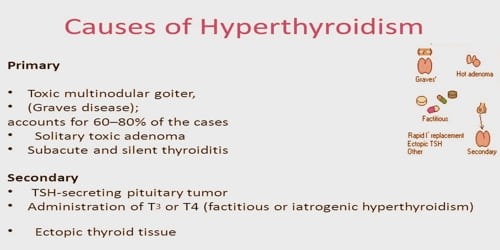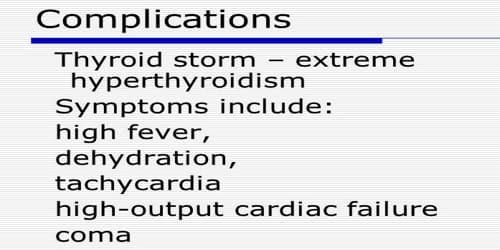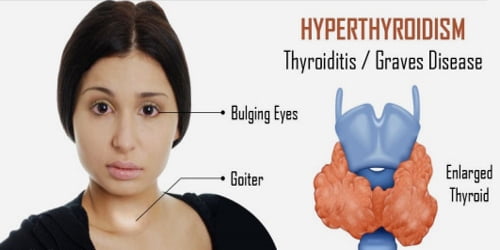Hyperthyroidism (Causes, Risk factors, and Complications)
Definition: Hyperthyroidism (or overactive thyroid) is the condition that occurs due to excessive production of thyroid hormone by the thyroid gland. The thyroid is a small, butterfly-shaped gland located at the front of our neck. It produces tetraiodothyronine (T4) and triiodothyronine (T3), which are two primary hormones that control how our cells use energy. Hyperthyroidism can accelerate our body’s metabolism, causing unintentional weight loss and a rapid or irregular heartbeat.
Hyperthyroidism is distinct from hypothyroidism. “Hyper” refers to the presence of too much thyroid hormone in the system. “Hypo” means too little, or an underactive thyroid.
There are several possible causes and a wide range of potential symptoms. It usually begins slowly, but, in younger people, onset can be sudden. Signs and symptoms vary between people and may include irritability, muscle weakness, sleeping problems, a fast heartbeat, heat intolerance, and diarrhea, enlargement of the thyroid, hand tremor, and weight loss. Symptoms are typically less in the old and during pregnancy.
Here are some key points about hyperthyroidism:
- Hyperthyroidism happens when the thyroid gland produces too much hormone.
- Graves’ disease is the most common cause.
- Medication can usually normalize hormone levels, but treatment may take 1 to 2 years.
- Untreated, hyperthyroidism can cause severe complications.
- With treatment, pregnancy should be able to progress normally.
An uncommon complication is thyroid storm in which an event such as an infection results in worsening symptoms such as confusion and a high temperature and often results in death. The opposite is hypothyroidism when the thyroid gland does not make enough thyroid hormone.
Several treatments are available for hyperthyroidism. Doctors use anti-thyroid medications and radioactive iodine to slow the production of thyroid hormones. Sometimes, hyperthyroidism treatment involves surgery to remove all or part of our thyroid gland.

Causes and Risk factors of Hyperthyroidism: There are several causes of hyperthyroidism. Most often, the entire gland is overproducing thyroid hormone. Less commonly, a single nodule is responsible for the excess hormone secretion, called a “hot” nodule. Thyroiditis (inflammation of the thyroid) can also cause hyperthyroidism. Functional thyroid tissue producing an excess of thyroid hormone occurs in a number of clinical conditions.
Hyperthyroidism can be actually caused by a number of conditions, including Graves’ disease, Plummer’s disease, and thyroiditis. Other causes of hyperthyroidism include:
- excess iodine, a key ingredient in T4 and T3
- thyroiditis, or inflammation of the thyroid, which causes T4 and T3 to leak out of the gland
- tumors of the ovaries or testes
- benign tumors of the thyroid or pituitary gland
- large amounts of tetraiodothyronine taken through dietary supplements or medication
Hypersecretion of thyroid stimulating hormone (TSH), which in turn is almost always caused by a pituitary adenoma, accounts for much less than 1 percent of hyperthyroidism cases.
Risk factors for hyperthyroidism, include:
- A family history, particularly of Graves’ disease
- Female sex
- A personal history of certain chronic illnesses, such as type 1 diabetes, pernicious anemia, and primary adrenal insufficiency
Without treatment, hyperthyroidism can seriously impact different bodily functions, including the heart. However, medication can normally control it by reducing thyroid hormone production.

Complications of Hyperthyroidism: An uncommon complication is thyroid storm in which an event such as an infection results in worsening symptoms such as confusion and a high temperature and often results in death. The opposite is hypothyroidism when the thyroid gland does not make enough thyroid hormone.
Hyperthyroidism can lead to a number of complications:
- Heart problems
- Brittle bones
- Red, swollen skin
- Eye problems
- Thyrotoxic crisis
The severity of hyperthyroidism and its symptoms depend on how well the body is able to react to the changes that result from the excess thyroid hormones, and how well patients follow their treatment plan.
Information Source:
















